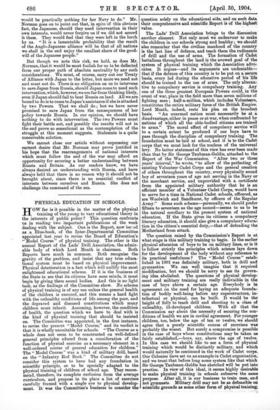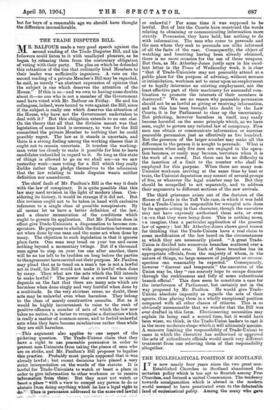H OW far is it possible in the matter of the
physical training of the young to vary educational theory in the interests of public policy ? This question confronts us in reading two important publications of the week dealing with the subject. One is the Report, now issred as , a Blue-book, of the Inter-Departmental Committee appointed last year to revise the Board of Education's "Model Course" of physical training. The other is the annual Report of the Lads' Drill Association, the admir- able body of which Lord Meath is chairman. Both Reports have much in common. Both recognise the gravity of the problem, and insist that any true educa- tional system must be based on physical improvement. Physical deterioration is a fact which will nullify the most enlightened educational scheme. If it is the business of the State to see that its citizens have sane minds, it must begin by giving them sound bodies. And this is no light task, as the findings of the Committee show. No scheme of physical training is of any use unless the general health of the children is ensured, and this means a hard fight with the unhealthy conditions of life among the poor, and the depraved and diseased constitutions which many children must inherit. Assuming, however, the condition of health, the question which we have to deal with is the kind of physical training that should be insisted on. The Committee was appointed, in the first instance, to revise the present "Model Course," and its verdict is that it is wholly unsuitable for schools. "The Course as a whole does not seem to be constructed on well-defined general principles educed from a consideration of the function of physical exercise as a necessary element in a well-ordered course of general education for children." The "Model Course" was a kind of military drill, based on the "Infantry Red Book." The Committee do not consider this system to have had any foundation in scientific principle, or to be specially adapted to the physical training of children of school age. They recom- mend, therefore, its complete exclusion from the average curriculum, and propose in its place a list of exercises carefully framed with a single eye to physical develop- ment. It was the Committee's business to consider the question solely on the educational side, and on such data their comprehensive and scientific Report is of the highest value.
The Lads' Drill Association brings to the discussion another element. Not only must we endeavour to make the children in our schools strong and healthy ; we should also remember that the civilian manhood of the country is the last line of defence, and teach them the rudiments of drill and the use of arms. The formation of Cadet battalions throughout the land is the avowed goal of the system of physical training which the Association advo- cates. It argues—and its arguments are undeniable— that if the defence of this country is to be put on a secure basis, every lad during the educative period of his life should be trained to the use of arms. The only alterna- tive to compulsory service is compulsory training. Any one of the three greatest European Powers could, in the event of war, place in the field more than seven millions of fighting men ; half-a-million, which includes Volunteers, constitutes the entire military force of the British Empire. Lord Meath, indeed, rests his plea on the broadest basis. "An unarmed nation must necessarily be at a disadvantage, either in peace or at war, when confronted by nations of which all the able-bodied citizens are trained to arms." The moral effect of compulsory service will to a certain extent be produced if our boys have to pass through the discipline of compulsory training. The foundation must be laid at school, and it is to the Cadet corps that we must look for the nucleus of the universal levy. No better statement of this view has ever been made than that by Sir George Taubman-Goldie, attached to the Report of the War Commission. "After two or three years' interval," he wrote, "to allow of the perfecting of existing Volunteer Cadet Corps and the general creation of others throughout the country, every physically sound boy of seventeen years of age not serving in the Navy or the merchant service, and unprovided with a certificate from the appointed military authority that he is an efficient member of a Volunteer Cadet Corps, would have to serve for a time in National Cadet schools, officered, as are Woolwich and Sandhurst, by officers of the Regular Army." Some such scheme—personally, we should prefer fifteen to seventeen as the age named—seems to us to be the natural corollary to the present system of national education. If the State gives its citizens a compulsory literary education, it should also give a compulsory educe,' tion in the citizen's essential duty,—that of defending the Motherland from attack.
The question raised by the Commission's Report is at what stage is this military training to begin. Is the earlier physical education of boys to be on military lines, or is it to follow strictly the principles which science lays down for the development of the body without any reference to its practical usefulness ? The "Model Course" estab- lished in 1901 was definitely military, both in drill and gymnastics. We can well imagine that it required modification, but we should be sorry to see its govern- ing idea abolished. The questions of physical develop- ment and military training are really indivisible in the case of boys above a certain age. Everybody is in agreement on the need for laying an adequate founda- tion of bodily well-being before any superstructure, in- tellectual or physical, can be built. It would be the height of folly to teach drill and shooting to a class of unhealthy, ill-developed children. With all that the Commission say about the necessity of securing the con- ditions of health we are in cordial agreement. For younger children, too, below the age of ten or twelve, we should agree that a purely scientific course of exercises was probably the wisest. But surely a compromise is possible in the case of boys whose constitutions may be taken as fairly established,—boys, say, above the age of twelve. In this case we should hie to see a form of physical training which would be distinctly military, and which would naturally be continued in the work of Cadet corps. Our Colonies have set us an example in Cadet organisation, and we trust that before long some system like that which Sir George Taubman-Goldie has sketched will be put into practice. In view of this ideal, it seems highly desirable to make physical training in schools subserve the same purpose. After all, it is our business to train men, and not gymnasts. Military drill may not be as defensible on scientific grounds as some other form of physical training; but for boys of a reasonable age we should have thought the difference inconsiderable.























































 Previous page
Previous page